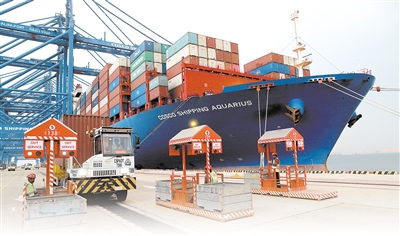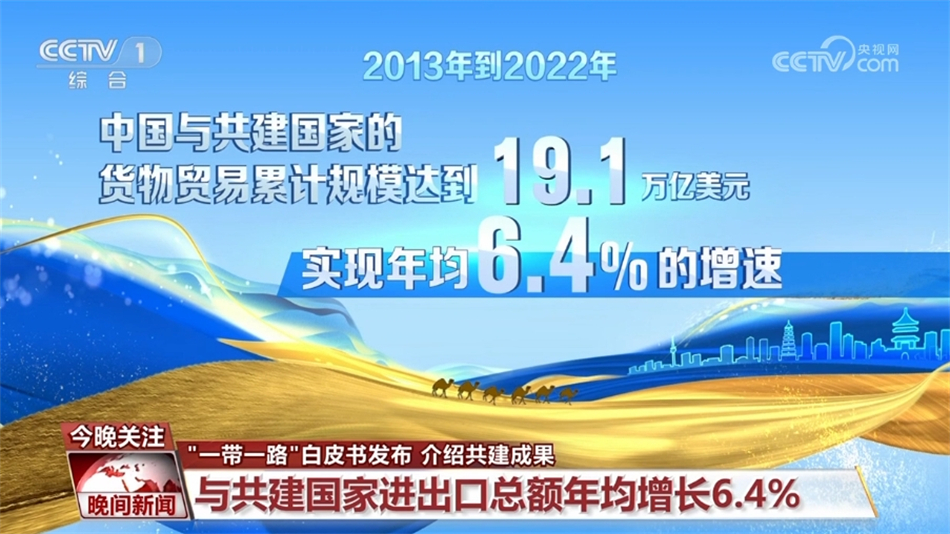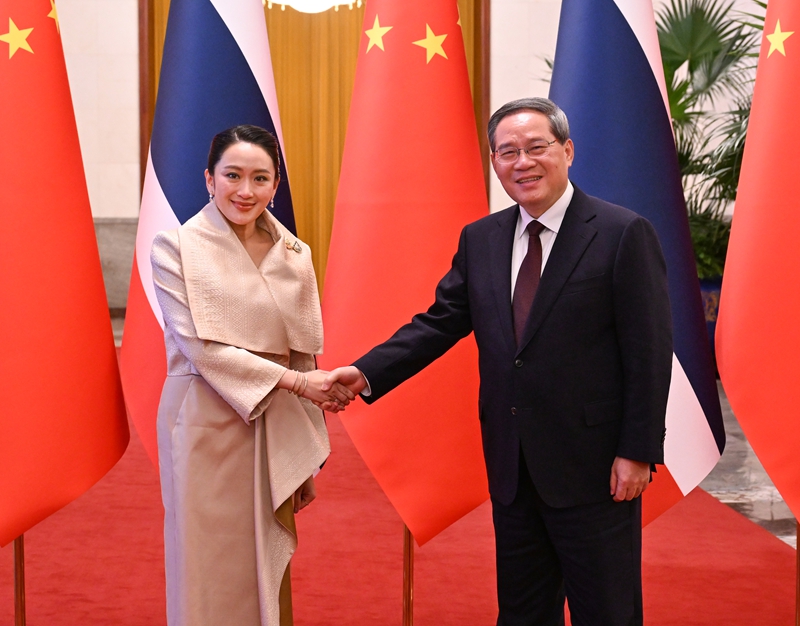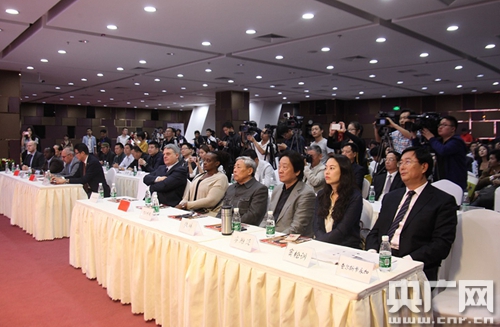Economic Globalization And The Development Of New Quality Productive Forces (deeply Study And Implement Xi Jinping Thought On Socialism With Chinese Characteristics For A New Era And Study The First Volume Of "Xi Jinping's Economic Works")
Economic Globalization And The Development Of New Quality Productive Forces (deeply Study And Implement Xi Jinping Thought On Socialism With Chinese Characteristics For A New Era And Study The First Volume Of "Xi Jinping's Economic Works")
Economic globalization is an objective requirement for the development of social productivity and an inevitable result of scientific and technological progress, and is in line with the long-term interests of mankind. At present, my country is accelerating the development of new quality productivity through scientific and technological innovation. In the context of the in-depth development of economic globalization
Economic globalization is an objective requirement for the development of social productivity and an inevitable result of scientific and technological progress, and is in line with the long-term interests of mankind. At present, my country is accelerating the development of new quality productivity through scientific and technological innovation. Against the backdrop of the in-depth development of economic globalization, no country can rely solely on its own strength to solve all innovation problems. Strengthening scientific and technological innovation is inseparable from building an open innovation ecosystem and promoting international scientific and technological innovation cooperation. Many of the works in the first volume of "Xi Jinping's Economic Works" have made profound discussions on building an open innovation ecosystem and promoting international scientific and technological innovation cooperation. For example, "Strengthening the Supply of Science and Technology and Serving the Main Battlefield of Economic and Social Development" points out: "We must enhance our ability to lead global flows such as commodities, capital, and information, promote the formation of a new pattern of opening up to the outside world, enhance the strength and ability to participate in the formulation of global economic, financial, and trade rules, and carry out international economic and scientific and technological innovation cooperation at a higher level"; "Deepening the understanding of major issues in medium- and long-term economic and social development" points out: "We must adhere to openness and innovation and strengthen international scientific and technological exchanges and cooperation"; "Chinese-style modernization must rely on scientific and technological modernization as support" points out: "Science and technological progress is a global and contemporary issue, and only open cooperation is the right way"; and so on. General Secretary Xi Jinping’s important statements have pointed out the direction for us to build an open and innovative ecosystem with global competitiveness and provided fundamental guidance.
At present, the world's major changes unseen in a century are accelerating, and economic globalization is facing many challenges and difficulties. The rise of trade protectionism, the generalization of national security concepts, the intensification of geopolitical conflicts, and the increase of unilateralism and bullying have exacerbated the uncertainty of the global political and economic pattern and directly or indirectly inhibited the process of economic globalization. While strengthening bilateral and multilateral cooperation, countries are also actively seeking to maximize their own interests. To thoroughly study and implement General Secretary Xi Jinping’s important statements, we must strengthen international scientific and technological innovation cooperation, actively integrate into the global scientific and technological innovation network, and accelerate the development of new quality productivity.
To develop new quality productivity, we must grasp the general trend of in-depth development of economic globalization
In "What is new quality productive force and how to develop new quality productive force", General Secretary Xi Jinping pointed out: "Science and Technology Innovation can give birth to new industries, new models and new momentum, and is the core element of developing new quality productive force"; in "Accelerating the construction of a new development pattern and grasping the initiative in future development", he pointed out: "In today's world, science and technology are the primary productive force and the first competitiveness." On the surface, economic globalization is the widespread flow of goods, capital, information, etc. around the world, but in essence, the force that dominates this flow is talents and scientific and technological innovation capabilities. At present, the globalization of scientific and technological innovation is becoming the main feature of economic globalization and a powerful driving force for in-depth development, and it is also a powerful weapon to deal with many global challenges.
From the perspective of technological development, a series of major breakthroughs have been made in cutting-edge fields such as artificial intelligence, aerospace, robots, quantum computing, biomedicine, new energy, and communication technology. While giving birth to new industries, new business forms and new models, it has injected new vitality into the recovery and transformation of the global economy. For example, with the rapid development and application of digital technologies such as the Internet and the Internet of Things, the rapid development speed of the digital economy, the wide radiation range, and the depth of its impact are unprecedented. It has become a key force in reorganizing global factor resources, reshaping the global economic structure, and changing the global competitive landscape, and further penetrates into all aspects of social production and life, promoting the transformation and upgrading of the global economy. Countries are competing to formulate relevant development strategies and introduce encouragement policies to promote the development of the digital economy. For example, green development has become an important trend in economic globalization. Most major countries in the world have strengthened green technology innovation, improved resource utilization efficiency, reduced the resource and environmental costs of development, better responded to climate change and promoted the transformation of green and low-carbon development. The new round of scientific and technological revolution and industrial transformation are making rapid progress, science and technology and economic and social development are accelerating the penetration and integration, innovation resources are accelerating the flow of globally, and economic and technological ties between countries are closer, and open innovation and collaborative innovation have become an important direction for scientific and technological innovation. Only by fully integrating into the global innovation network with an open mind and action can we better utilize global innovation resources and accelerate the development of new quality productivity.
From the perspective of international competition, the world's major changes unseen in a century have accelerated its evolution, the scientific and technological revolution and the game of great powers are intertwined, and the high-tech field has become the forefront and main battlefield of international competition, profoundly reshaping the global order and development pattern. Major countries in the world have introduced new innovation strategies, increased investment, and strengthened the competition for strategic innovation resources such as talents, patents, and standards. In recent years, emerging market countries and developing countries have risen and made significant progress in scientific and technological innovation, industrial upgrading, institutional reform, etc., which not only has an important impact on global economic development, but also poses challenges to the competitive landscape of the traditional international market. At the same time, the widespread application of digital technology has promoted the vigorous development of new trade modes such as e-commerce and digital trade, the scope and scale of international trade and investment activities have been continuously expanded, and competition among countries has become increasingly fierce. The source of international market competitiveness is increasingly relying on various forms of innovation, including scientific and technological innovation, business format innovation, management innovation, business model innovation, etc. As the crystallization of scientific and technological progress, industrial upgrading and business model transformation, new quality productivity is becoming the main source of a country's enhancement of international competitiveness.
Accelerating the development of new quality productivity can promote economic transformation and upgrading and structural optimization, achieve sustainable development, and thus continuously improve competitiveness in international competition. Specifically, by gathering global innovation factors and strengthening scientific and technological innovation, especially original and disruptive scientific and technological innovation, we can cultivate new development momentum; by tapping the potential needs of consumers, developing new products, and relying on technological innovation to reduce the cost of new products, new business forms and new models, we can lead the rapid and healthy development of new products, new business forms and new models; by timely applying the achievements of scientific and technological innovation to specific industries and industrial chains, we can transform and upgrade traditional industries, cultivate and expand emerging industries, and lay out and build future industries, and then drive the transformation and upgrading of the global industrial chain with its own deep transformation and upgrading.
Management innovation and institutional innovation are important components of developing new quality productivity. By providing better public services, continuously improving the business environment, and creating a good atmosphere that encourages innovation and entrepreneurship, the government can give full play to the decisive role of the market in resource allocation, making innovation a new engine driving development. In this process, enterprises can better adapt to changes in market demand. Through technological innovation and management innovation, they can integrate resources around the world, continuously improve production efficiency and product and service quality, reduce production costs, and thus gain a higher position and greater voice in the global value chain.
Develop new quality productivity and actively respond to new challenges of economic globalization
At present, while economic globalization is developing in depth, it also faces new challenges, showing the rise of anti-globalization thoughts and fragmented trade rules. In "Learning Development with New Development Concepts", General Secretary Xi Jinping pointed out: "The situation of international economic cooperation and competition is undergoing profound changes, and the global economic governance system and rules are facing major adjustments." From the perspective of historical materialism, the new challenges facing economic globalization stem from the inadaptation of production relations and the development of productivity. The rapid development of productivity globally requires production relations to adapt to it. However, the rise of anti-globalization thoughts and fragmented trade rules have led to lag in the transformation of production relations, hindering the free flow of technology, capital and data, restricting the development of productivity, and posing challenges to my country's development of new quality productivity.
For a long time, some Western countries have occupied the high-end part of most industries in the international industrial chain in the process of economic globalization, and have gained huge benefits from it. Such huge benefits have also prompted the economic development of these Western countries to rely more on high-end industries in the industrial chain, resulting in problems such as hollowing out and structural imbalance in their domestic manufacturing industries. With the increasing downward pressure on the world economy in recent years and the inherent drawbacks of Western modernization, the contradictions between growth and distribution, capital and labor, efficiency and fairness in some Western countries have become more prominent. Some Western politicians mistakenly attribute their domestic development problems and policy mistakes to economic globalization, which has led to the rise of trade protectionism and unilateralism, increased international trade barriers, and limited scientific and technological exchanges, which has limited the technological diffusion and market expansion required by the development of productivity. At the same time, multilateralism has been hindered and challenged, resulting in the differentiation of governance mechanisms and rules in related fields and the increase in institutional costs of factor flow. The emergence of these phenomena has greatly reduced the efficiency of countries integrating into global innovation networks and brought new risks and challenges to countries' development. In my country's economic development practice, these challenges are concentratedly reflected in the adverse changes in the external environment facing my country's development. This fully demonstrates that lag in production relations has hindered the global allocation of advanced production factors. To actively respond to this challenge, we must use innovation to promote the adjustment and optimization of global production relations and lead the construction of an open world economy.
In "What is new quality productive force and how to develop new quality productive force", General Secretary Xi Jinping pointed out: "The prominent feature of new quality productive force is innovation"; in "Accelerating the implementation of the free trade zone strategy and building a new open economy system", he pointed out: "Multilateral trading system and regional trade arrangements have always been the two wheels driving the forward development of economic globalization"; in "Continuously opening up a new realm of Marxist political economy in contemporary China", he pointed out: "Actively participate in global economic governance and promote the development of the international economic order in the direction of equality, justice, and win-win cooperation." To implement General Secretary Xi Jinping’s important statements, we must clearly oppose unilateralism and protectionism, advocate a global economic governance concept of equality, openness, cooperation and sharing, improve a free and open international trade system, make full use of trade platforms such as the World Trade Organization and various bilateral and multilateral trade agreements, promote the construction of a fair, reasonable and transparent international economic and trade rules system, promote the liberalization and facilitation of trade and investment, maintain the stability and smooth flow of the industrial chain and supply chain, and promote the further opening, exchange and integration of the global economy. At the same time, we must coordinate the promotion of scientific and technological innovation and management innovation, strengthen industrial coordination, and promote the continuous improvement of global production relations.
Specifically, in terms of scientific and technological innovation, we will strengthen the basic R&D capabilities of digital technology around independent innovation of key digital core technologies, and optimize global resource allocation through data-driven optimization, and reduce market entry costs through digital platforms such as cross-border e-commerce; focus on green and low-carbon transformation of economic and social development, and accelerate the promotion and application of green technology innovation and advanced green technology, and develop green and low-carbon industries and supply chains, etc., to help reduce global carbon emissions and thus break trade protectionism. In terms of management innovation, by vigorously developing intelligent manufacturing, using automation and big data to improve production efficiency, enhance the competitiveness of my country's "going global" enterprises in the global value chain in the context of fragmented trade rules, and further promote the optimization and adjustment of the global value chain and supply chain. In terms of industrial collaboration, we will promote technology and infrastructure cooperation through high-quality joint construction of the "Belt and Road", help the co-construction countries break the low-end lockdown of the traditional value chain, realize industrial transformation and upgrading, further integrate into global division of labor, and resolve the contradiction of uneven distribution of dividends of economic globalization.
At the same time, it is necessary to see that as scientific and technological innovation becomes the main battlefield of global competition, the coordination of science and technology policies and industrial policies should be strengthened to better guide the allocation of global science and technology resources, and avoid mismatch, waste and even conflicts caused by this. At present, countries are in different development stages, different economic systems and different market environments. We should actively advocate strengthening communication among countries to create a fair and just market environment; promote the liberalization and facilitation of trade and investment, reduce tariff and non-tariff barriers, and promote the free circulation of goods and services. At the same time, the development and growth of multinational enterprises put forward higher requirements for the construction of an international rule of law environment. Optimizing the international rule of law environment through judicial cooperation and legal aid will help resolve legal disputes and problems in multinational investment and corporate operations. In addition, we must strengthen intellectual property protection, improve relevant laws and regulations, regulate corporate behavior, and provide legal guarantees for technological innovation and industrial development.
These innovative measures can promote the reshaping of the global production mode and improving production relations, not only provide guarantees for my country's development of new quality productivity, but also inject cooperative impetus into global economic governance, and promote global economic governance to develop in a more inclusive and balanced direction.
Steadily expand institutional opening up to help accelerate the development of new quality productivity
In "Accelerating the Construction of a New Development Pattern and Focusing on Promoting High-Quality Development", General Secretary Xi Jinping pointed out: "Relying on my country's super-large-scale market advantages, attract global resource elements with the domestic circulation, enhance the linkage effect of the two domestic and international markets and two resources, and improve the quality and level of trade and investment cooperation. Steadily expand institutional opening up such as rules, regulations, management, and standards"; in "What is new quality productive force and how to develop new quality productive force", it pointed out: "We must expand high-level opening up to the outside world to create a good international environment for the development of new quality productive force." General Secretary Xi Jinping’s important statements provide scientific guidance for us to promote the development of new quality productivity through openness and innovation.
The development of new quality productivity requires both the government's advanced planning guidance and scientific policy support, as well as market mechanism regulation and continuous innovation of micro-subjects such as enterprises. It is jointly cultivated and driven by the government's "visible hand" and the market's "invisible hand". Therefore, we must further deepen reforms in a comprehensive manner and build a new type of production relationship that is compatible with it. This can not only promote intelligent manufacturing with new technologies and then reconstruct production methods, but also optimize resource allocation through innovations in platform economy, sharing economy, etc., and promote international production collaboration through global network cooperation. Therefore, it is necessary to expand high-level opening up to the outside world, to create a good international environment for the development of new quality productivity, and to promote the construction of new production relations.
Under the new era conditions, high-level opening up to the outside world is an important prerequisite for gathering advanced and high-quality production factors such as global technology, talents, and data, and plays an important role in accelerating the development of new quality productivity. Promote high-level coordinated opening up, continuously expand the breadth and depth of opening up, give full play to the role of promoting reform and development through opening up, be able to actively respond to the needs of the times, improve the comprehensive efficiency of opening up, create new advantages in international cooperation and competition, and activate the momentum for developing new quality productivity. At present, promoting high-level opening up is transforming from opening up of the flow of factors such as goods, services, funds, and talents to opening up of the system such as rules, regulations, management, and standards. Institutional opening-up aims to further create a market-oriented, law-based, and international first-class business environment by improving and perfecting relevant rules and systems, promote industrial upgrading and structural adjustment, and improve the efficiency and innovation capabilities of economic operation; at the same time, enhance the institutional voice in the international market and shape an international rule system that is more conducive to the economic development of the country and promote the prosperity of the world economy.
For the development of new quality productivity, steady expansion of institutional opening can better adapt to innovation needs. For example, to give full play to the role of new production factors such as technology and data in promoting the development of new quality productivity, we require clear innovation benefits with the property rights system, incentives for technological research and development with the distribution system, and promoting cross-border collaboration in the form of organizations. Steadily expand institutional opening up, promote the comprehensive optimization of property rights protection mechanisms, market mechanisms, investment and financing systems, etc. through the internationalization of rules and modernization of governance, and promote the comprehensive optimization of property rights protection mechanisms, market mechanisms, investment and financing systems, etc., which can promote the efficient allocation of new production factors such as technology and data, and thus stimulate the innovative potential of new quality productivity. Steadily expanding institutional opening can better promote the free flow of technology, capital and talents. For example, by lowering the market entry threshold and improving policy transparency, promoting the free flow and allocation of factors, and strengthening incentives for technological innovation, we can create a good environment for changing the development mode; by creating an external environment conducive to win-win cooperation, promoting the internationalization of financial services, and participating in and leading the formulation of digital economic and trade rules, we can attract and accumulate advanced global production factors for the development of new quality productivity. To this end, we must steadily expand institutional opening up, actively connect with international high-standard economic and trade rules, and achieve rules, regulations, management and standards in the fields of property rights protection, industrial subsidies, environmental standards, labor protection, government procurement, e-commerce, finance, etc., create a transparent, stable and predictable institutional environment, and promote the accelerated development of new quality productivity. (Zhang Yuyan, Su Jian, Shao Yujia)
(This article is the result of the National Committee of the Chinese People's Political Consultative Conference's "Research on the Developing New Quality Productivity Mechanics" project)
"People's Daily" (page 09, August 5, 2025)





